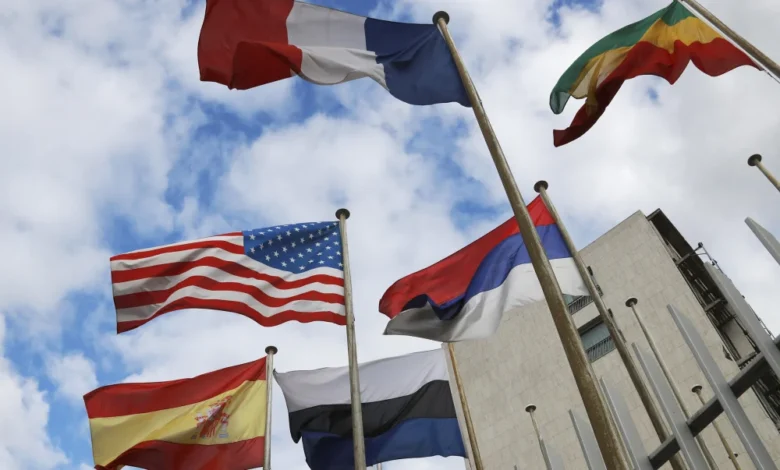US Announces Decision To Withdraw From UNESCO Again

Washington, D.C.: The United States government has announced it is planning to pull out of the United Nations Educational, Scientific and Cultural Organisation (UNESCO), which marks the third time in a row that the country has left the Paris-based agency for culture. The decision was made two years after the U.S. rejoined the organisation under the Biden administration. This is yet an additional shift in policy under the direction of Donald Trump. Donald Trump.
As per the White House, the move is a result of concerns about the perceived bias against Israel within UNESCO. White House deputy spokesperson Anna Kelly declared, “President Trump has decided to withdraw the United States from UNESCO—which supports woke, divisive cultural and social causes that are totally out-of-step with the commonsense policies that Americans voted for in November.” UNESCO as well as the White House have not yet made public statements that confirm the move.
The news comes as an unsurprising development for UNESCO staff, who predicted that the U.S. would withdraw again following an extensive review ordered by the Trump administration in the spring of this year. The consensus was that returning US participation in UNESCOby 2023, under the leadership of President Biden, will make the relationship between UNESCO and the Trump administration less secure in the event that it returns to control.
The United States first withdrew from UNESCO in 1984 under the Reagan administration. The reason was the agency’s corruption and mismanagement, as well as the belief that the institution was utilized to advance Soviet Union interests. It was the U.S. that rejoined nearly two decades later, in 2003 under the presidency of George Bush.
In 2011, more recently in 2011, in 2011, the U.S. ceased financing UNESCO when it granted UNESCO the status of a member to Palestine and aligned its decision with Israel’s position on UNESCO policies. Israel, as well as the U.S., argued that the change was an expression of bias against Israel. Six years later, in 2017, the Trump administration outlined plans to remove the U.S. from UNESCO entirely in light of similar concerns. This decision was made official in the year 2018. However, the administration of President Biden returned to the organization in 2023, highlighting how important it is to redesign international relations and support cultural diplomacy.
This decision to take out poses questions regarding the future of the global initiatives of UNESCO that focus on encouraging cooperation between scientists and cultural institutions. It promotes initiatives such as the protection of World Heritage sites, as well as support for international education and conservation of diversity in culture. UNESCO has long been considered an example of cooperation between cultures and international cooperation, but there has been criticism of certain member states due to its apparent politically motivated tendencies.
Removing U.S. membership in UNESCO could also spark a debate about the response of global institutions to global politics and the rise of nationalist sentiment. The Trump administration’s decision is part of its wider attempts to repress multilateral institutions it considers to be incompatible with America’s principles and values. A number of foreign analysts have warned that this decision will increase the isolation of the U.S. from the international community.
The impact of this decision on the funding of UNESCO will be substantial. It is likely to have a significant impact on the organisation’s funding. The United States was historically one of the largest financiers, contributing vital funding to its programs. After a halt to its financial contribution in the year 2011, the U.S. absence has led to budget deficits, which UNESCO has had to work through.
The supporters as well as the opponents of the change have responded with aplomb at the news. The critics of the move claim that cooperation between international cultural institutions such as UNESCO is essential to address worldwide issues that range from inequality in education to climate change. The supporters, on their side, argue it is imperative that the U.S. cannot continue to help organisations that show prejudice or do not align with American principles.
The U.S.’s recent withdrawal from UNESCO is a continuation of the trend of off-and-on membership in global organisations. It reflects criticism of bureaucratic inefficiency as well as conflict between members. The question of whether it is likely that the United States will rejoin UNESCO at some point in the near future is to be seen, especially in the context of how political administrations and theories evolve in the course of time.
For further details about this story’s progress, additional announcements and updates are expected to be issued by both the White House and UNESCO in the next few days.
About UNESCO
The United Nations Educational, Scientific and Cultural Organization (UNESCO) was created in 1945 in order to foster cooperation between nations by promoting education, science, and the arts and culture. The main initiatives of the organization are protecting the world’s heritage, increasing education and literacy across the globe, and defending press freedom and encouraging international dialogue. Its headquarters are in Paris, and it currently has 193 members.





